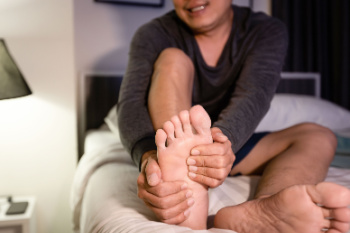
Plantar fasciitis is not just about overuse. It is often about the shoes you wear. The wrong shoes can strain the plantar fascia, the thick band of tissue supporting your arch, making every step painful. Flat, unsupportive shoes like flip-flops or worn-out sneakers force the fascia to overstretch, leading to inflammation. High heels shift weight forward, tightening the Achilles tendon and putting extra stress on the heel. Even walking barefoot on hard surfaces can aggravate symptoms. Wearing supportive footwear with proper arch support and cushioning can make a huge difference. A firm, yet flexible sole, a slight heel drop, and a snug, but not tight, fit help reduce strain. Orthotics or insoles may also provide relief. If your plantar fasciitis persists, it is suggested that you schedule an appointment with a podiatrist for treatment and footwear recommendations.
Plantar fasciitis is a common foot condition that is often caused by a strain injury. If you are experiencing heel pain or symptoms of plantar fasciitis, contact one of our podiatrists from CyFair Family Foot Care. Our doctors can provide the care you need to keep you pain-free and on your feet.
What Is Plantar Fasciitis?
Plantar fasciitis is one of the most common causes of heel pain. The plantar fascia is a ligament that connects your heel to the front of your foot. When this ligament becomes inflamed, plantar fasciitis is the result. If you have plantar fasciitis you will have a stabbing pain that usually occurs with your first steps in the morning. As the day progresses and you walk around more, this pain will start to disappear, but it will return after long periods of standing or sitting.
What Causes Plantar Fasciitis?
- Excessive running
- Having high arches in your feet
- Other foot issues such as flat feet
- Pregnancy (due to the sudden weight gain)
- Being on your feet very often
There are some risk factors that may make you more likely to develop plantar fasciitis compared to others. The condition most commonly affects adults between the ages of 40 and 60. It also tends to affect people who are obese because the extra pounds result in extra stress being placed on the plantar fascia.
Prevention
- Take good care of your feet – Wear shoes that have good arch support and heel cushioning.
- Maintain a healthy weight
- If you are a runner, alternate running with other sports that won’t cause heel pain
There are a variety of treatment options available for plantar fasciitis along with the pain that accompanies it. Additionally, physical therapy is a very important component in the treatment process. It is important that you meet with your podiatrist to determine which treatment option is best for you.
If you have any questions, please feel free to contact our offices located in Cypress and Spring, TX . We offer the newest diagnostic and treatment technologies for all your foot care needs.
